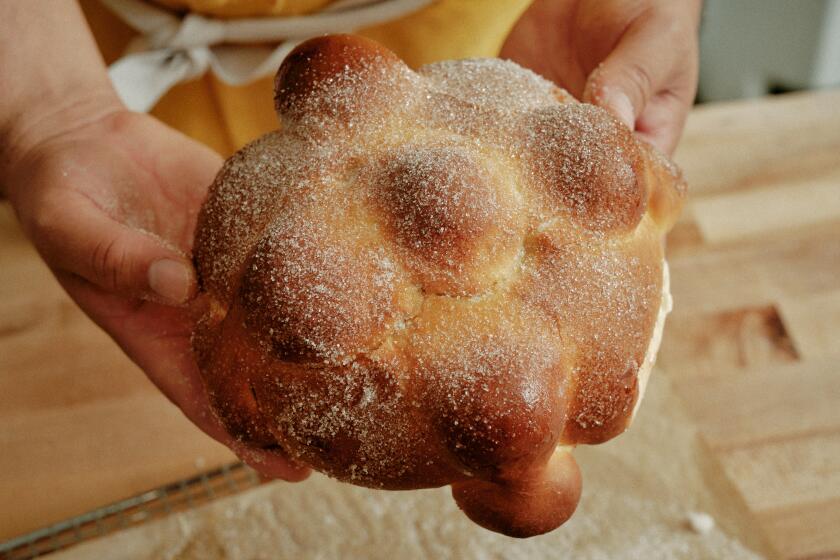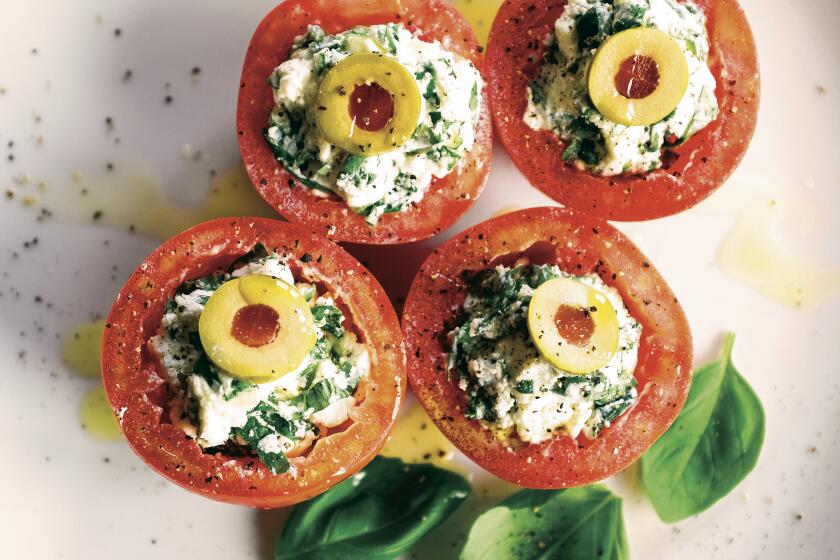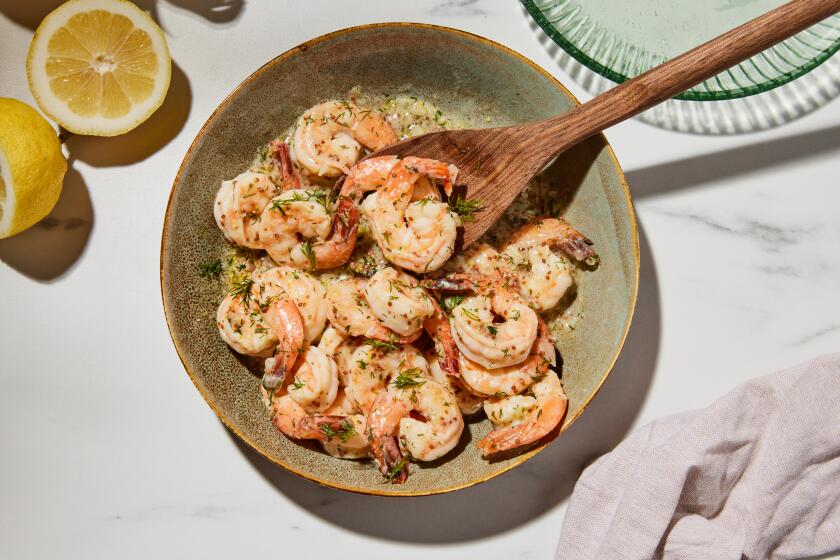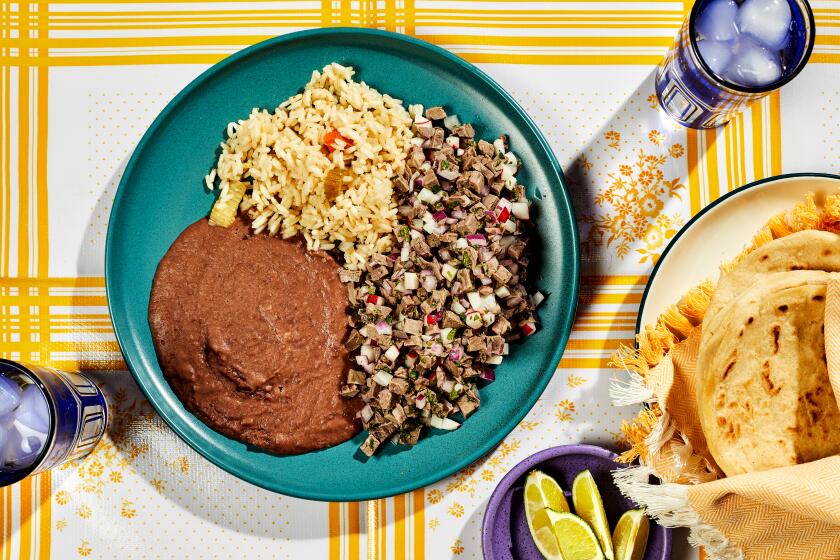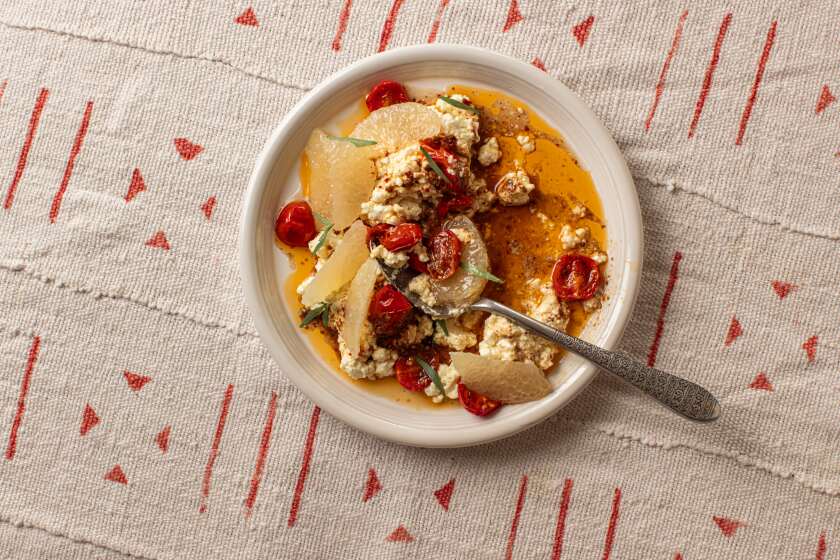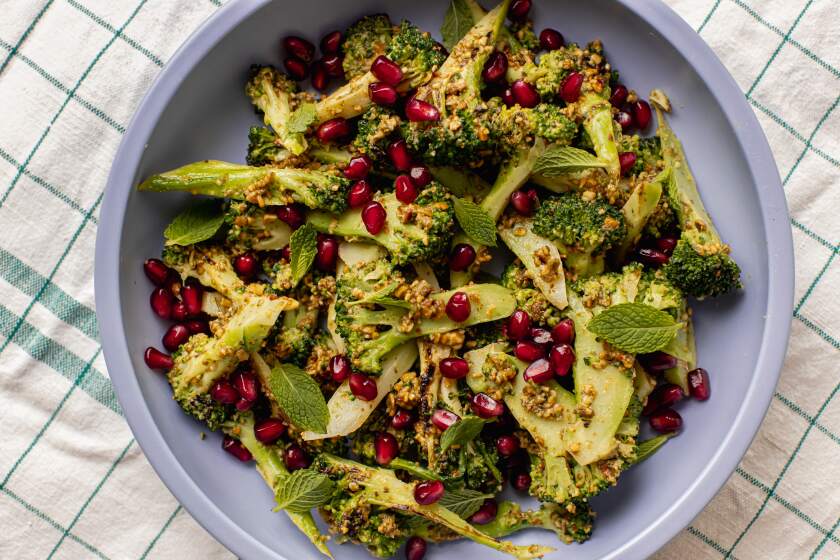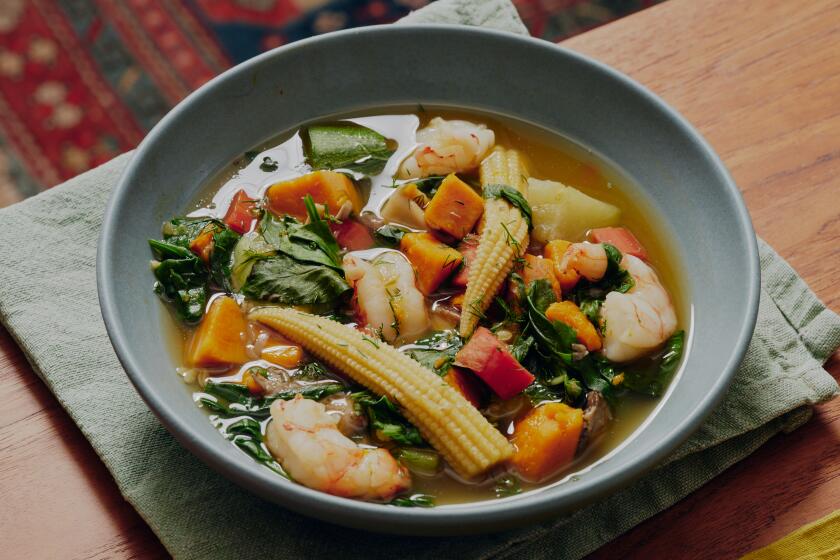White anchovy salad
When a friend invited us to dinner recently, he apologized, by saying it would be only grilled salmon or Italian sausages and “a big salad.” With his wife out of town, he said, he was wrangling two young kids and an ailing father-in-law and needed to keep things simple.
My first thought was: And you’re making salad? Washing and drying all that lettuce?
Within 10 minutes of walking into his kitchen, my consort and I each had a wineglass and a knife and were slicing up red cabbage and sweet onion and too much broccoli and de-stringing sugar snap peas, while his daughter peeled and grated carrots and he shucked corn and scraped the kernels into a big bowl. A salad spinner never even hit the counter. And what we produced was a revelation. It was essentially raw vegetables in vinaigrette, but it made me wonder why I have been so literal-minded in thinking of salad as a green thing.
A leafless salad is a whole other experience. A great big toss of raw vegetables -- some whole, some chopped -- provides even more satisfying crunch and good, clean flavor than a bowl of dressed greens, but it outperforms lettuce because you get such a pure sense of ingesting health along with flavor and texture. It’s also easy, and didn’t someone say this is the season for that?
After that dinner I started obsessing on other ways salad could be redefined. There really is no reason that a concept owing its origins to salt (the Latin root of the word is sal) has to be dependent on greens. Just consider how insidiously salad has been evolving over the last decade as ethnic interpretations have gone mainstream.
While Americans were all happily dressing mesclun, some great new ideas were migrating from Asia and Europe.
Thai beef salad is a classic example. The only “leaves” in it are fresh cilantro, but the combination of seared steak, scallions, minced mint, chiles and peanuts in a lime dressing with fish sauce and tamari tastes light, lively and refreshing.
The concept works even better with Southwestern ingredients, with toasted pumpkin seeds substituting for the peanuts, and chipotle chiles stepping up for the bird chiles. Fresh oregano rather than mint also steers the flavor profile toward Mexico, and lots of avocado added to the pan juices round out the richness so that no oil is needed in the vinaigrette.
But the heart of the salad is the meat, matched so well to the herb. Skirt steak has a juicy tenderness that works especially brilliantly against the cilantro. I found that even people who think cilantro tastes like Zest will eat this happily.
Squid is even riper for salad treatment with nominal leaves. A new restaurant called Ditch Plains in Manhattan serves a spicy calamari salad that is much more inventive and complex than the menu description indicates. The proportions are roughly three-fourths squid, one-fourth lettuce, in this case Romaine and radicchio, cut into shreds. The rest is just a hyper-chile dressing and a smattering of toasted sesame seeds.
The squid is batter-fried, so the lettuce wilts against it, and the whole assemblage is much more addictive than even fried calamari with a dipping sauce.
The key ingredient is a chile paste called sambal oelek, which is a good balance of heat and flavor. (Huy Fong Foods in Rosemead produces a good one that is widely available.) The other essential is light frying of the squid dusted in flour.
Updating tradition
SOME more traditional salads sans lettuce are out there waiting to be updated too. Salade nicoise, the Provencal cliche with tuna, potatoes, green beans, olives, tomatoes and eggs, can be served without a leaf under it. But it can be taken a step further by eliminating the canned tuna that characterizes it and showcasing the ingredient that is usually considered only a garnish: anchovies.
White anchovies are starting to turn up everywhere as a main ingredient in salads, and they give a whole new flavor and personality to a Nicoise. The taste is more sweet than fishy, and the saltiness is not so aggressive.
Beef, calamari and anchovies may be more surprising stand-ins for lettuce in an exceptional salad, but it is our friend’s one-bowl sensation that I will be knocking off repeatedly from now on. He used a bagful of vegetables from the summer-all-year produce aisles at Whole Foods, but seasonal is the way to go.
Right now, the first local corn is coming into farmers markets and there are radishes, cucumbers, peppers, sugar snaps and grape tomatoes to be added to the broccoli florets, cabbage and onion he used as a foundation. As the season goes on and the markets get more bounteous, anything raw can be tossed in: sliced zucchini, just-picked green beans, green onions, kohlrabi, fennel, whatever.
The dressing can be a basic blend of mustard, balsamic vinegar and good olive oil, but a little garlic and basil round out the flavor.
You could also toss in grated cheddar or Monterey Jack, or crumbled blue cheese; you could add pine nuts or toasted almonds; you could even use, as our friend did, sun-dried cranberries. Or those kumquats now in season.
Make it ahead like coleslaw or put it together at the last minute. Either way will be proof that the road to a good salad does not have to pass through the lettuce patch. It can lead to a whole new definition.
Combine the mustard and lemon juice in a small bowl and whisk to blend. Whisk in the olive oil until smooth, then the mayonnaise. Stir in the capers and chives and set aside.
Combine the potatoes and salt in a medium pot and add cold water to cover. Bring it to a boil and cook until the potatoes are easily pierced with a knife, about 10 to 15 minutes. Remove the potatoes with a slotted spoon to a colander to drain.
Add the green beans to the water and cook until just tender, about 2 to 4 minutes. Drain well.
While the potatoes are still warm, cut them lengthwise into quarters. In a bowl, combine the potatoes with the olives. Add half the dressing and toss to coat. Season with salt and pepper to taste. Arrange in the center of a platter.
Toss the green beans with more of the dressing in the same bowl. Add the peppers, season with salt and pepper and toss to mix. Arrange along one side of the potatoes.
Arrange the eggs and tomatoes on either side of the other vegetables. Drape the anchovies decoratively over the potatoes and beans and serve with the remaining dressing on the side.
Get our Cooking newsletter.
Your roundup of inspiring recipes and kitchen tricks.
You may occasionally receive promotional content from the Los Angeles Times.









